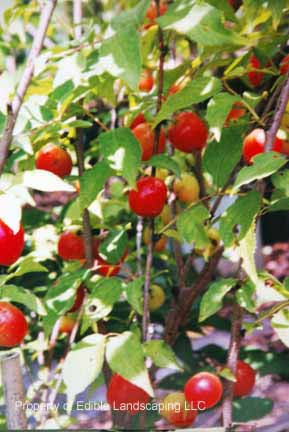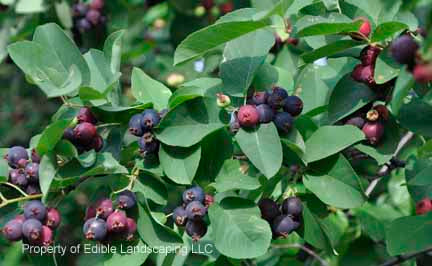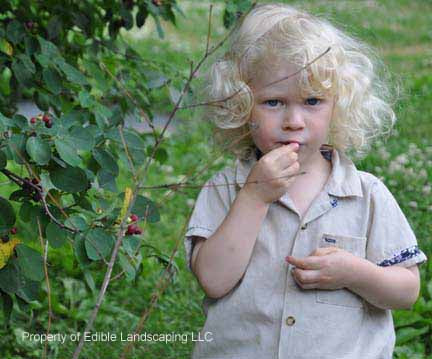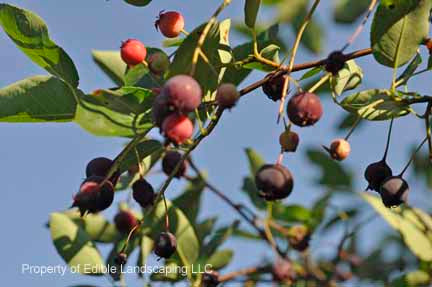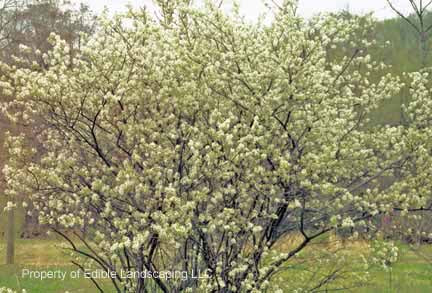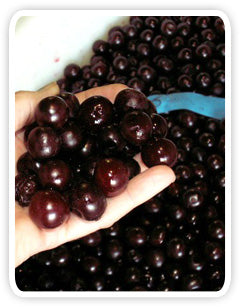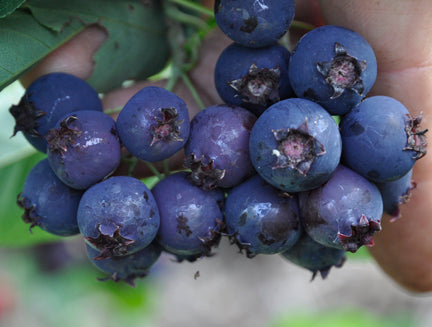
Aronia melanocarpa
Black Aronia is a small shrub about 6', with blueberry size black fruit that can be made into a healthy drink if sweetened. Blooms white flowers in spring followed by black fruits with vivid red leaves in the fall. Tolerates wet sites, sun or shade. Self fertile, not subject to any diseases or insect problems. Space 6' circle. Zones 3 - 8.
Observation from L Momper.
Aronia melanocarpa is related to the red or purple chokeberry and shares the same characteristics of being extremely sour (in fact, inedible when raw) and is likewise extremely high in antioxidants. Aronia melanocarpa (commonly referred to as the black chokeberry) has one of the highest concentrations of anthocyanin and proanthocyanidin (antioxidant properties) ever measured in plants - a characteristic shared with the the red and purple chokeberry. The berries are used for jelly, fruit syrup, wine, tinctures, and tea. Because of the astringent (sour) nature of the fruit, a sweetener of some kind is usually necessary, as in the making of jelly, jam, and fruit syrups. Although some people object to this fruit because of the need to usually add sugar/sweetener, I believe that the tremendous antioxidant properties far outweigh this point.
I have used aronia berries for jam in the past, and found the flavor deep and resonant, similar to a black currant or a blackberry. I intend to use the berries for a fruit syrup as well -- for crepes and pancakes, drizzled over poached pears, combined with port wine for a meat glaze, or added at the bottom of bottles when bottling kombucha. Although I have not tried it, I suspect that aronia juice could easily be added to a sweet organic fruit juice such as pear or apple in much the same way as cranberry juice is combined with these juices in the commercial market. In my experience the aronia melanocarpa plant is smaller in scale than the larger chokeberry varieties, which makes it a manageable plant for use in edible landscaping. It can be used in sun or as an understory plant, is trouble-free, and is happy almost anywhere. Don't assume that the sour taste of the berries will deter birds - birds don't seem affected by this fact and they will happily feast if allowed!
| Plant Characteristics | |
|---|---|
| Pest Resistance | Excellent |
| Disease Resistance | Excellent |
| Drought Tolerance | Very Good |
| Heat Tolerance | Very Good |
| Humidity Tolerance | Excellent |
| Sun Tolerance | Very Good |
| Wet Soil Tolerance | Fair |
| Shade Tolerance | Very Good |
| No Spray | Excellent |
| Salt Tolerance | Fair |
| Fresh for Kids | Poor |
| Thorns | No |
| Plant Type | Shrub |
| Soil Type | Adaptable |
| Edible Type | Fruit |
| Self Fertile | Yes |
| This information is accurate to the best of our knowledge, comments/opinions are always welcome | |
Aronia is a deciduous, cold-hardy shrub beautiful in the landscape, with its white flowers in the spring and colorful red foliage and heavy, dark fruit in the fall.
Aronia came be bothered by deer and rabbits. The fruit are enjoyed by birds.
Aronia berries can be canned or the juice extracted for making jelly. Aronia berries are also used in healthful fruit drinks. The juice contains high levels of anthocyanins (source of red color) and flavonoids. This plant is extensively grown in Europe, where yields of up to 38 pounds of fruit per bush have been reported.
Black chokeberry is native to the Great Lakes region and the Northeastern U.S., and extends south into the high elevations of the Appalachian mountains It is hardy to zone 3.
Aronia prefer moist woods, but also occurs in drier thickets or clearings on bluffs or cliffs.
The black chokeberry grows well in full sunlight, but is moderately tolerant of shade. The best growth and fruit production occurs on low moist but well-drained sites, in full sun. It is not drought-tolerant. New shoots will grow up around established plants, filling in the space between plants like a hedgerow.
Control of surrounding area is important, keep weeds and grass away. Shallow cultivation works best or weed control fabric and mulch. Cultivation can also be used to stop the spread of shoots and suckers, if that is a concern. Very little suckering has been noticed on chokeberry in the Northern Plains. Thinning of older stems is recommended every few years.
Aronia have very few disease and pest problems. Mildew can become a problem when plants do not receive adequate sunlight and air circulation.

